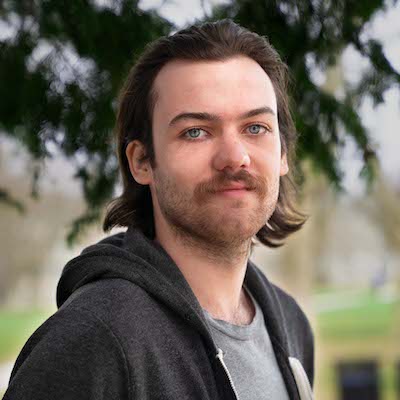Majors: Gender and Women’s Studies and Film/Media
Hometown: New Canaan, CT
Q. What makes the College of Arts and Sciences at URI unique?
A. The College of Arts and Sciences is a great place because it is home to such a diverse range of options for students. I have been very lucky to be able to explore my interests here more so than I think I would at a different school. I originally wanted to go to an art school for film, and got into it, but instead chose URI because it allowed me to get a broader education. Without attending the URI College of Arts and Sciences I may never have found Gender and Women’s Studies – my second major– and I would have robbed myself of that indispensable experience. The two majors complemented each other in such a way that I could never have predicted . Each one informing and supporting the other.
What accomplishments and/or activities at URI are you most proud of now?
My favorite accomplishment I am proud of at URI is my two year tenure as a contributing reporter at the Good 5 Cent Cigar. While I eventually had to leave the paper due to the time commitment, I credit my short time there as instrumental in my development as a student and as a person. When I was a shy freshman it forced me outside my comfort zone and took me to a myriad of interesting places – the State House and the post-Super Bowl riot to name a few. Not to mention greatly improved my writing and time management skill – there is no place that a deadline is so strict as in a newspaper.
What research projects, internships, experiential learning, and/or study abroad programs did you participate in at URI?
I am currently involved with several major projects at URI. My senior year has been a busy one. I am currently in the production stage of my senior thesis film, the horror film Demoniac. The film is a blend of horror tropes and some philosophical questions that I have become fascinated with, which I am making for Professor Keith Brown’s ‘Advanced Film Production Capstone’ Class. Through Dr. Jody Lisberger’s ‘Feminist Thought into Action’ I was set up as a volunteer with the Womxn Project. I am also currently working on my GWS capstone project about how Masculinities are constructed to promote war in the Russian-Ukrainian Conflict. These are all enhancing my education because they are all a culmination of my education to this point. I am now forced to apply my knowledge and begin the transition from student to professional.
What do you value about your liberal arts education?
I value the breadth of my liberal arts education. My Gender and Women’s Studies education has opened my eyes to broader concepts than are found in Film production or even theory classes, but which meld nicely with my interests as a filmmaker. In the same way, it is due to my filmmaking training that I found an interest in propaganda and how it relates to gender and gender construction. Without the broad education provided by a liberal arts program I would not have been able to come to such a unique focus of study on my own.
What have been some highlights of your time in both majors?
It’s hard to choose highlights; it’s all been so great. I would say however that in the GWS department probably my biggest highlight came when I was writing an essay about a feminist activist from the 1880s, Lucy Parsons. I found a book written at the time, about the Haymarket Affair, in which she took part. It hardly mentioned her by name, instead referring to her in relation to her husband, but figuring out how to tease out her story from this source was a big step in my education. It opened me up to much more interesting methods of research in the future. In the Film/Media department it is much harder to come up with a single highlight- but I’ll try to come up with a set of highlights. While I have been mostly focused on film studies, and essay writing, I find I am at my happiest when I am on set. The feeling of collaboratively creating a ‘second reality’ of a film is something hard to put into words. You feel a sense of accomplishment just by being there. You forget that there are more steps to the process. When you finally see your film on screen, finished – it doesn’t matter how it came out– there is a distinct magical feeling that overwhelms you.
What’s next for you?
I plan on taking a year or two off to work, and then back to school for my masters in film studies, and then ideally my Ph.D. I come from a long line of teachers, and I hope to fulfill that ‘family business’ by becoming an academic and an educator.
Anything else you’d like to share?
Only that I really appreciate the opportunity to be captured in this Senior Spotlight. It really means a lot that Professor Kathleen McIntyre thought I was worthy of this honor.

